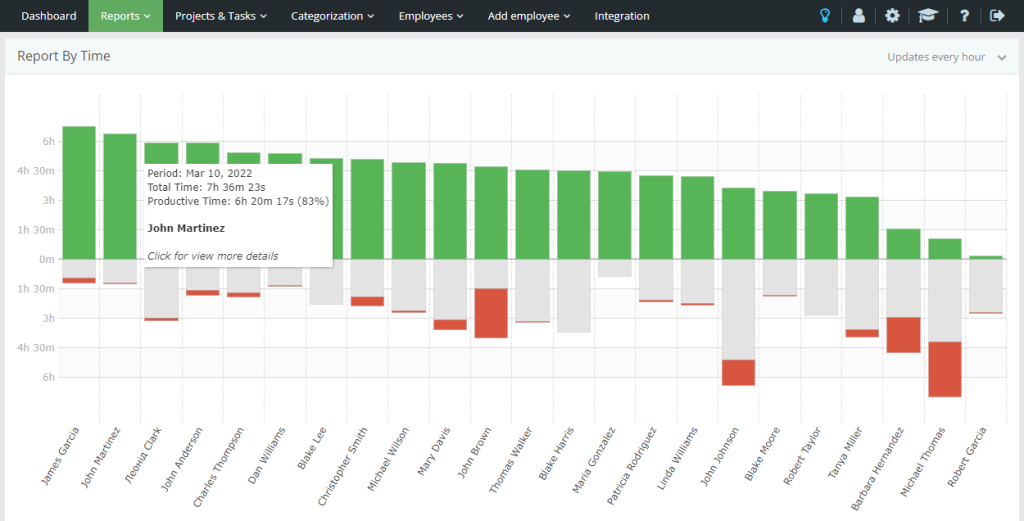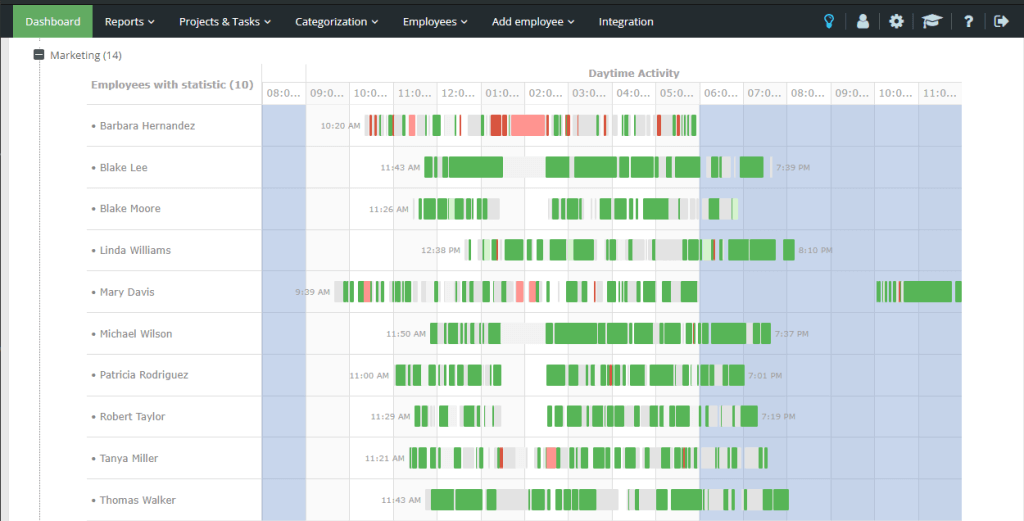A 2025 comprehensive study revealed that unrecorded work activities cost the US economy $37 billion annually, with the average Fortune 500 company losing $8.7 million per year due to invisible productivity gaps. Yet 89% of C-suite executives believe their workforce operates at optimal efficiency.
The Enterprise Time Black Hole: When Scale Becomes the Enemy
The harsh reality of enterprise operations isn't that employees work too little—it's that nobody knows where 8 hours of daily productivity actually disappears across 1,000+ person organizations.
Recent studies show that full-time employees are productive for only 2 hours and 53 minutes per day on average, with the remaining time lost to what researchers call “phantom productivity”—activities that appear work-related but generate zero business value.
Real Enterprise Challenge: Unrecorded tasks cost the US economy 50 million productive hours each day, with large corporations bearing the heaviest burden. When you multiply this across Fortune 500 workforces, the numbers become staggering.
Microsoft's Productivity Revolution: After implementing comprehensive time intelligence systems across their global workforce, Microsoft discovered that over 60% of Fortune 500 companies now use Microsoft 365 to empower frontline workers. Their internal data showed that employees spent an average of 5.1 hours weekly in unnecessary meetings—leading to a complete overhaul of their meeting culture.
What Happens When Enterprise-Scale Teams Work Without Visibility
The Most Dangerous Enterprise Myth: “More managers equals better oversight.”
Actually, 72% of meetings are considered unproductive, leading to wasted time and money for businesses, resulting in a cumulative loss of $37 billion annually.
The Phantom Productivity Epidemic affects large organizations disproportionately:
- 51% of employees spend their workday on tasks that offer little to no value to their core responsibilities
- 36% of millennials and Gen Z report checking their phones for 10 or more hours a week at work
- Over the course of a year, the average knowledge worker spends 103 hours in unnecessary meetings, 209 hours on duplicated work, and 352 hours talking about work
Goldman Sachs Discovery: Their 2024 workforce analysis revealed that analysts spent 34% of their time searching for information that already existed within company systems. The solution involved implementing advanced time tracking and workflow optimization, resulting in millions in recovered productivity.
The Enterprise Productivity Paradox: Why “More Control” Creates Less Results
Disengaged and burned-out employees are draining 9% of the world's GDP, with large corporations suffering the most severe impact.
Harvard Business Review findings: More than 50% of employees reported being “relatively unproductive” at work, with enterprise-level organizations showing the highest rates of disengagement.
Enterprise Time Tracking Success Story: Companies implementing intelligent time tracking solutions report dramatic improvements. Businesses that can get employees to track their time better can earn a revenue increase of up to 61%.
One Fortune 500 technology company discovered through automated time tracking that their development teams spent 6.2 hours weekly on status meetings and progress updates. By replacing 60% of these with automated reporting systems, they recovered 18,000 productive hours annually across their engineering department.
The Numbers That Transform Enterprise Operations
Real data from large organizations implementing comprehensive time intelligence:
- Time theft affects 75% of businesses with enterprise impact ranging from 1-7% of total payroll
- $588 billion in annual losses from employee distractions and inefficient task management
- 27.5% reduction in organizational productivity caused by multitasking in large teams
- 82% of employees do not use a structured time management system, leading to compounded inefficiencies
- Employees are interrupted around 60 times per day on average, with each interruption requiring up to 25 minutes for full recovery
- $2,400 average savings per employee annually for companies implementing comprehensive time tracking
Most Shocking Enterprise Discovery: Companies using advanced time tracking systems like Yaware discovered that 34% of their large-scale projects involved multiple teams unknowingly working on identical solutions—representing millions in duplicate effort costs.

Why Fortune 500 Companies Embrace Intelligent Time Intelligence
The Controversial Reality: 97% of companies think spying on their remote workers makes them more productive—but the most successful implementations focus on transparency, not surveillance.
Enterprise Success Pattern: The global time tracking software market size is projected to grow from USD 8.36 billion in 2025 to USD 29.88 billion by 2033, driven primarily by enterprise adoption.
Real Enterprise Transformation: Companies implementing comprehensive time intelligence report that transparency eliminates workplace politics and creates data-driven performance cultures. When teams can see how time actually flows across projects, productivity improvements happen organically.
Yaware.TimeTracker Enterprise Implementation: Large organizations using Yaware TimeTracker report average productivity improvements of 23% within the first quarter. The platform's automatic categorization of productive vs. unproductive time gives executives unprecedented visibility into workforce efficiency without creating a surveillance culture.

The Question Every Enterprise Executive Must Answer This Quarter
Here's the question that will determine your company's competitive position in 2025:
“How many millions are we losing by operating blind to our actual workforce productivity patterns?”
The US economy loses 50 million hours in productivity per day because of unrecorded work activities. For Fortune 500 companies, this translates to an average of $8.7 million in annual losses.
The Enterprise Time Intelligence Revolution is accelerating. Asia Pacific region has been dominating the market while US companies lag in adoption—creating a global competitive disadvantage.
Companies that implement intelligent time tracking gain immediate advantages:
- Real-time visibility into project progress and resource allocation
- Automated identification of productivity bottlenecks and inefficiencies
- Data-driven insights for workforce optimization and strategic planning
- Transparent performance metrics that eliminate subjective evaluations
The Strategic Imperative: Your competitors are already using these insights to optimize their operations. The question isn't whether to implement enterprise time intelligence—it's how quickly you can deploy it.
Ready to discover your organization's real productivity numbers? Advanced enterprise time tracking solutions like Yaware.TimeTracker provide comprehensive workforce insights within 48 hours of implementation, delivering the visibility needed to transform operational efficiency.

